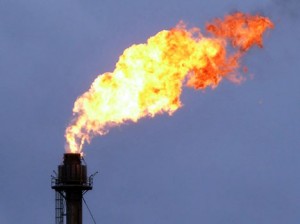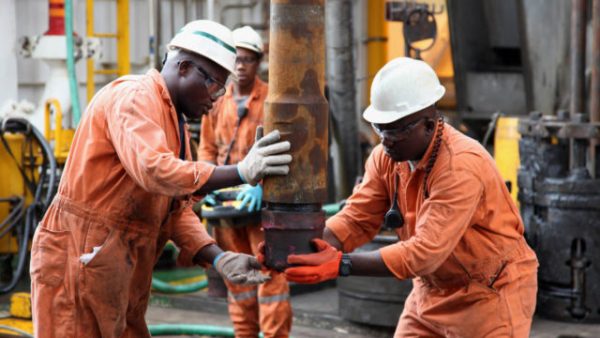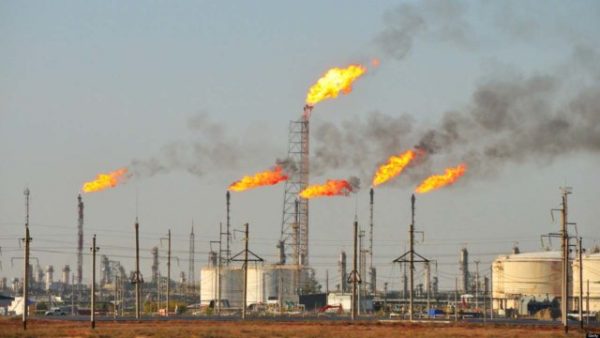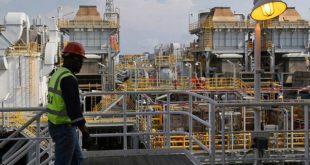
Despite growing domestic gas demand in the country, oil companies in the first half of the year flared a quantum of natural gas capable of generating 100,000 megawatts of electricity.
According to data from the Nigerian National Petroleum Corporation, about 198 billion standard cubic feet of natural gas was flared from January to June.
The companies, which include international oil companies and indigenous players, burnt 43.7 billion scf in January (19.17 per cent of production), 50.1 billion scf in February (23.20 per cent of production) and 38.3 billion scf in March (17.77 per cent of output).
In April, 22.3 billion scf of gas was flared, 19.7 billion scf in May and 23bn scf was wasted in June.
“This amount of gas flared in just six months can generate about 100,000 megawatts of electricity, more than double our current generation capacity,” an industry expert told our correspondent.
Nigeria, Africa’s top oil producer and largest holder of natural gas reserves on the continent, is home to the world’s ninth biggest gas reserves, with about 187 trillion cubic feet of proven gas reserves and 600 Tcf of unproven gas reserves.
But low investment in gas infrastructure over the years has continued to hamper the harnessing of the huge natural gas reserves in the country for domestic consumption, particularly for power generation.
The International Energy Agency in its special report ‘Africa Energy Outlook’, released last week, noted that Nigeria’s Gas Master Plan detailed the aim to increase domestic supply and to bring in new pricing and policy regulations, and provide a blueprint for gas infrastructure.
It said the strategy was to anchor gas supply around “gas to power” in the immediate term while also developing a broader agenda for gas to support industrialisation and provide gas for export.
“Not all of the elements required to underpin the objectives of the master plan are yet in place, such as the necessary gas and electricity pricing mechanisms and appropriate upstream incentives,” the IEA said.
It further said that a critical uncertainty for Nigeria’s gas supply outlook was its ability to stimulate significant production of non-associated gas.
“Huge resources exist, sufficient to cover both domestic demand and exports. Production of non-associated gas increases in our projection period, but it is gradual. Exploiting this resource requires a change in focus by the upstream sector and, importantly, the government to establish a framework to incentivise the necessary large-scale capital investment.”
This will require a stable, attractive investment environment generally and the development of a bankable commercial structure in Nigeria’s gas sector which includes price reforms, improvements in regulatory arrangements, a redefinition of the role of public companies in the gas sector and an alternative to the current Nigerian National Petroleum Corporation joint venture financing model, the IEA said.
Shell Petroleum Development Company had recently said that joint venture funding challenges had resulted in delays to some gas-gathering projects, adding that two of these projects, which were expected to gather an additional 35 percent of associated gas by 2014-15, are likely to be delayed.
The oil major, in a briefing note, said it reduced flaring volume from its facilities by about 75 per cent between 2003 and 2012 and flaring intensity (the amount of gas flared per barrel of oil produced) by around 60 per cent over the same period.
The delay in building the seventh train has cost Nigeria $2.5bn per year due to revenue from LNG export, as well as the opportunity to further reduce gas flared from oil fields in the Niger Delta, according to Platts.
The Nigeria LNG said it was already losing global market share due to the delay in expanding the plant’s output from 22 million metric tonne per annum to 30mpta.
The managing director, NLNG, Mr. Babs Omotowa, was quoted by Platts to have said the company was concerned that the non-passage of the Petroleum Industry Bill could hinder expansion at the six-train LNG plant despite having already signed agreements with potential buyers in Japan, China, India and Malaysia.
“The long deliberations on the passage of the PIB have put much of the investments in oil and gas on hold because of a lack of clarity around the policy direction of the government,” Omotowa said. “This development may impact on gas supplies to feed additional trains,” he added.
Industry analysts and stakeholders have stressed that the vast gas reserves in the country can underpin economic growth and diversification to Nigeria through more power generation, more gas-based industrial activities such as fertiliser plants to boost agriculture, petrochemical industries and also high-value exports.
“Passage of the Petroleum Industry Bill is strongly supported as it will ensure the proper regulation and administration of the petroleum industry towards effective and efficient production and supply of petroleum resources including natural gas,” the chairman and chief executive officer of the Nigerian Electricity Regulatory Commission, Dr. Sam Amadi, said at a recent event.
 MMS PLUS NG – Maritime, Aviation, Business, Oil and Gas News Online Newspaper with coverage in Maritime, Oil and Gas, Aviation, Power and Energy as well as Financial News
MMS PLUS NG – Maritime, Aviation, Business, Oil and Gas News Online Newspaper with coverage in Maritime, Oil and Gas, Aviation, Power and Energy as well as Financial News









